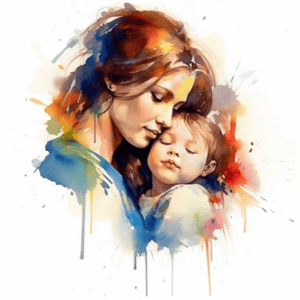
Camille Jarmie Harris, Ph.D. has recently joined the faculty at Pacifica in the Clinical Psychology program. This is Part II in the conversation I had with Dr. Harris about her work and teaching in hermeneutic analysis.
Angela: What is it like working with infants in a therapeutic setting, since as you say, they cannot thrive without being in relation to the family?
Camille: From Ages 0 to 5, I work within the context of the family, often times supporting the parents to understand their children and work through challenges they’re experiencing themselves so they can be present and available to their baby. A birthing parent and family in the post-partum period might be experiencing a whole range of emotional experience that can be related the stress of pregnancy, birth, and psychological transition into parenting, and can sometimes lead to emotional challenges that affect ability to interact and connect with baby. There are diverse expectations about what this time is “supposed” to be like that are informed by personal experience as well as by the larger context of culture. So I help parents to understand the challenges they might be having, understanding who this baby is, to learn to trust their intuition and empower them to understand themselves and their own children in terms of the behavior they see. I work to empower a sense of knowing in those early years.
Angela: I’m curious how depth psychology, in a clinical setting, works differently than mainstream psychology and deals with these important transitions in life. Few things are more fundamental than birth. How does depth psychology add something unique to this?
Camille: Clinical psychology in the United States tends to focus on diagnosis based on problematic symptoms. This way of seeing symptoms as problems to be treated also reflects the model of treatment and ongoing care many clients receive. Depth psychology takes a different stance. One of curiosity. We pause long enough to wonder what symptoms communicate about our deeper humanness, and ask the question, “towards what purpose?” This is decidedly different than a medical model of care that focuses on eradicating the symptom before ever recognizing its purpose. Is the symptom a manifestation of internal conflict? A representation of challenges emerging from interpersonal relationship? Or, even an internalization of cultural dynamics that manifest in individual suffering? Without being able to ask these questions, as depth psychology encourages us to do, how can we treat the suffering we see in the world?
 Depth psychology looks for patterns and understanding of the numinous without reducing it to a medical model or what is happening only in the body or the brain or the mind as a representation of illness on an individual scale. I have found that this approach has allowed me to translate what I know of the different modes of being in a clinical practice; it’s the ability to be multilingual, so-to-speak, within the field of psychology, and to understand the complexity of the factors that impact a person’s life.
Depth psychology looks for patterns and understanding of the numinous without reducing it to a medical model or what is happening only in the body or the brain or the mind as a representation of illness on an individual scale. I have found that this approach has allowed me to translate what I know of the different modes of being in a clinical practice; it’s the ability to be multilingual, so-to-speak, within the field of psychology, and to understand the complexity of the factors that impact a person’s life.
Angela: You have recently taken a position as Core Faculty and Associate Chair in the Clinical Program at Pacifica, and we’re very fortunate to have you on the faculty. What drew you to continue your professional road here as a teacher?
Camille: I am an alumna of the program I’m teaching in. I believe in it. It has helped me to transform my life. The program has been a home where I been able to re-vision and re-define myself, and I know that to be true for others as well. I’ve worked in large research institutions and seen the ways in which our field both helps and traumatizes, and have wanted to be part of the solution for that. I’m inspired by the work of Hillman, Winnicott, Downing, Romanyshyn, Freud, and Jung, just to name a few, and I’ve found it troubling that the works of so many clinicians and scholars are absent or misrepresented in mainstream psychology. Pacifica is unique because it includes these voices as essential to the practice of psychology, so it was a natural fit for me.
In terms of my teaching, it’s been a dream and a homecoming to be able to come back to Pacifica to support our students along their own depth process, and to help bring depth psychology to the world in this way. I’m a resister of the mainstream in many ways, seeing patterns within the larger culture which both empower and disempower, and Pacifica has encouraged my ability to notice and take action in the world in response to those patterns. My hope is that it is the ability to see these patterns that help to empower my clients and also my students to do the same, taking the very best our field has to offer rather than only what is dictated by the stakeholders of psychology as managed care. I once heard James Hillman speak to the Pacifica community as “people of purpose,” that we may not all carry the same theoretical approach but we are passionate and driven here.
Angela: How would you describe the learners in the Clinical Program and the teaching/learning process?
Camille: One of the things that’s unique about the clinical Ph.D. at Pacifica is that those who are drawn to it are often interested in furthering not only their education in clinical practice but also their scholarship and community advocacy. My experience of Pacifica was of an institution that challenged me academically to excel, expecting me to do my own depth psychological work, and that combination helped me to become the strongest and most informed healer I could be, and to take action in the world. My dissertation was life-changing in that it was a soulful journey that enabled me to take the work into the world and inform my clinical setting. The program, at least as I experienced it, helped me to be competitive as a clinician, a researcher, and an advocate. Additionally, because I wasn’t focused on whether Pacifica had APA accreditation, I was able to look for training opportunities which helped me to grow into the clinician I wanted to be, such as being able to connect to an internship that closely aligned to what I wanted to do after I graduated. I credit the faculty and staff of our program (and the larger institution) with supporting me to find my best path towards practice and scholarship, and I feel lucky to now be part of that team.
Angela: Your current research on hermeneutics focuses on many things, but among them you’ve described childhood in the West as a “moratorium.” What does that mean, and how do you think depth psychology might aid to lift the moratorium?
.png?width=300&height=300&name=Keiron%20Le%20Grice%20Core%20Faculty%20and%20Co-Chair%20of%20the%20Jungian%20and%20Archetypal%20Studies%20specialization%20of%20the%20Depth%20Psychology%20program%20at%20Pacifica%20(1).png) Camille: This builds on the work of many scholars, such as Barbara Rogoff at UCSC, who has spent decades focusing on the idea that childhood is a cultural construct, and the idea of what it means to be a child is dependent on the culture in which they live. Therefore, it is possible to see that the way that children live in the United States with years spent in an education system that separates them from an understanding of what it means to be an adult and very little in terms of rituals of becoming, a moratorium is created. Another example is the work of philosopher J. H. van den Berg, who described how childhood itself is a cultural construct, and that even a few hundred years ago there was no such thing as a “child” just a younger, perhaps less experienced person. This type of work helps us to see how the dynamics of childhood informs a larger conversation of the influence of the cultural context on individual experience. What, for instance, are the benefits and challenges of children learning to sit for long periods during the day, taking in theoretical information, and being able to reproduce that information in the form of tests and assignments? Or the benefits and challenges of parents being able to work seemingly unencumbered by their very young children? What are the messages we hear about what it means to be a child? Parent? Family? Employee? And so on. My work seeks to understand the underlying meaning of these messages from society and how they impact the families I work to support.
Camille: This builds on the work of many scholars, such as Barbara Rogoff at UCSC, who has spent decades focusing on the idea that childhood is a cultural construct, and the idea of what it means to be a child is dependent on the culture in which they live. Therefore, it is possible to see that the way that children live in the United States with years spent in an education system that separates them from an understanding of what it means to be an adult and very little in terms of rituals of becoming, a moratorium is created. Another example is the work of philosopher J. H. van den Berg, who described how childhood itself is a cultural construct, and that even a few hundred years ago there was no such thing as a “child” just a younger, perhaps less experienced person. This type of work helps us to see how the dynamics of childhood informs a larger conversation of the influence of the cultural context on individual experience. What, for instance, are the benefits and challenges of children learning to sit for long periods during the day, taking in theoretical information, and being able to reproduce that information in the form of tests and assignments? Or the benefits and challenges of parents being able to work seemingly unencumbered by their very young children? What are the messages we hear about what it means to be a child? Parent? Family? Employee? And so on. My work seeks to understand the underlying meaning of these messages from society and how they impact the families I work to support.
Angela: Thank you so much for speaking with me. I look forward to having you as a faculty member here at Pacifica!
 Camille Jarmie Harris, Ph.D. is a licensed psychologist in private practice, as well as Core Faculty and Associate Chair in the Clinical Psychology program at Pacifica Graduate Institute. She received her Ph.D. in Clinical Psychology from Pacifica in 2018 following a Master’s Degree in Clinical Psychology from Lewis & Clark Graduate School of Education and Counseling specializing in counseling with children and adolescents in 2011. Her clinical areas of expertise focus on supporting birthing families during pregnancy, childbirth, and postpartum periods, as well as early attachment, work with children and adolescents, and animal-assisted therapy through a depth orientation. Dr. Jarmie Harris’s areas of interest in research and scholarship also include the larger impact of society on individual wellbeing, best practices in psychotherapy with birthing families, children and adolescents, as well as eco-psychology, sustainability, and social justice.
Camille Jarmie Harris, Ph.D. is a licensed psychologist in private practice, as well as Core Faculty and Associate Chair in the Clinical Psychology program at Pacifica Graduate Institute. She received her Ph.D. in Clinical Psychology from Pacifica in 2018 following a Master’s Degree in Clinical Psychology from Lewis & Clark Graduate School of Education and Counseling specializing in counseling with children and adolescents in 2011. Her clinical areas of expertise focus on supporting birthing families during pregnancy, childbirth, and postpartum periods, as well as early attachment, work with children and adolescents, and animal-assisted therapy through a depth orientation. Dr. Jarmie Harris’s areas of interest in research and scholarship also include the larger impact of society on individual wellbeing, best practices in psychotherapy with birthing families, children and adolescents, as well as eco-psychology, sustainability, and social justice.

Angela Borda is a writer for Pacifica Graduate Institute, as well as the editor of the Santa Barbara Literary Journal. Her work has been published in Food & Home, Peregrine, Hurricanes & Swan Songs, Delirium Corridor, Still Arts Quarterly, Danse Macabre, and is forthcoming in The Tertiary Lodger and Running Wild Anthology of Stories, Vol. 5.



